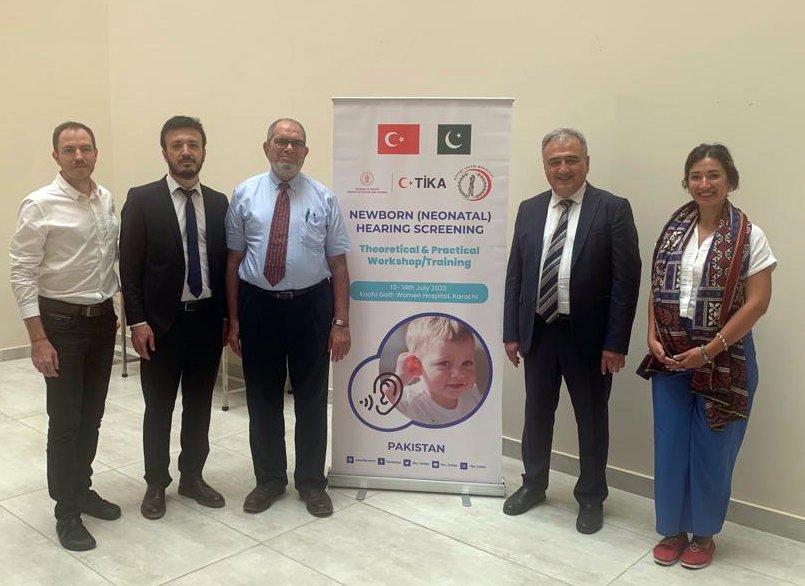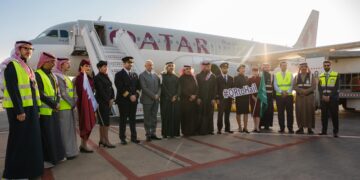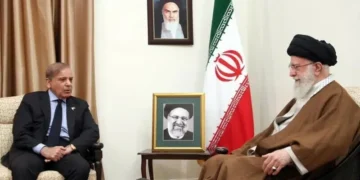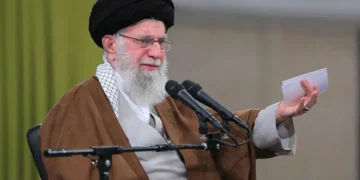In the first year of life if diagnosis and treatment of deaf and mute children is done then the recovery is very successful. In developed countries, after successful newborn hearing screening programs, they are closing schools for the deaf and mute children. Children can be examined free of charge with the devices provided by Türkiye (T?KA) to five charitable hospitals in Karachi and Hyderabad.
Recently, a couple came to my clinic with their three-and-a-half-year-old kid. His mother told me that the child cannot speak and it looks like he has very low hearing. We also had it examined by our nearby doctor. The doctor and our elders in the family said that when he grows up, he will start talking. We become very curious when we see our children stand apart from those children who laugh and talk while playing with each other. One of my friends advised me to show him to the ENT Doctor. He may have a tongue tie. That’s why he can’t speak. Detailed medical history revealed both mother and father are first cousins. The boy was their first child and had a normal birth. When the boy was examined, he seemed intelligent, but he was not communicating. His ears were fine from the outside and the eardrum was also normal. The child did not have a tongue tie under the tongue. I told the parents, the child cannot speak because he has little sense of hearing. For this, a hearing test (BERA) will be performed. This test will give us an idea of how much hearing loss he has, and then according to that the treatment will be given. Two days later, his parents came with his report. According to the report, he was having severe to profound hearing loss in both ears. They became very anxious when I told them about his condition. I explained to them that it was a bit late to diagnose this disease, but this disease is still treatable. I gave them a trial of hearing aids in both ears for six weeks. Besides, this I sent him for speech therapy. It was explained to the parents if the hearing does not improve with the hearing aids. A cochlear implant will be required for the child. Because the diagnosis of the disease was a bit late lot of time and effort will be spent on speech therapy to get the optimum results.


When the parents left the clinic I thought that If such a smart child had been diagnosed and treated earlier in the first year of his age, his life would have been changed. Today the parents would have been enjoying from his talking and naughtiness. We see such types of patients every day in our clinics. Parents bring them for examination at the age of five or later. Usually, children at this age are deprived of speaking and understanding because they have no sense of hearing. Then they enroll children in special schools to learn sign language. This becomes a liability for the parents throughout their lifetime. It all happens in the community due to a lack of awareness and guidance. Medical science is very advanced nowadays. According to recent research, children’s comprehension, learning, and speaking skills depend on their listening abilities. Speech centers develop in our brain at the age of the first year of life. If these centers in the brain do not receive audio signals, then speech centers stop growing. Because of this, the child is deprived of both the power of comprehension as well as the power of speech throughout life. It is a reality now that if hearing loss is diagnosed in the first year of age and with proper management, the children can go to normal school.
In this modern world, It is now mandatory for newborn babies in developed countries to undergo a hearing screening test before going home. These tests are now computerized, they can be easily monitored later. Babies who fail to pass this test continue to be tested. The goal of these countries is to diagnose deafness in their babies within three months and start treatment within six months. This is due to the normal development of the speech centers in the baby’s brain. Thus, the baby continues to grow just as children of his age. This program is so successful now schools for deaf and mute children are being closed in these countries. The World Health Organization (WHO) also started focusing on this program. When we look at Pakistan, these tests are done in very few hospitals. Our neighboring countries such as Iran, India, and Bangladesh are ahead of us in this regard.
In Pakistan, like other underdeveloped countries, the number of children with severe to profound hearing loss is between 4 and 6 per 1,000 live births. In developed countries, hearing impairment in children is limited from 1 to 2 per 1,000 live births. If the hearing loss in the newborn baby is diagnosed in the first year and its treatment is done on time, this child can receive an education like any other normal child. They can learn other different skills and gain status in their society like other normal people. If it is late in the diagnosis, as frequently happens in our society because of negligence then the ability of such children to speak may not be normal. These children are lagging behind the children of their age group in their educational, social, and professional lives.
According to this situation, the Universal Newborn Hearing Screening Program should be mandatory in our country. We highly appreciate and are grateful to the government of Turkey and its people for their cooperation The Turkish Cooperation and Coordination Agency-(TIKA) Karachi branch organized a two-day workshop on “Newborn Hearing Screening” at Koohi Goth Hospital Karachi on the 13th and 14th of July. About 135 participants from more than 10 different institutes in Karachi and Hyderabad participated in this workshop. This was the first workshop of its kind in Pakistan. The master trainer of this workshop was Professor Mohammed Tayyar. He belongs to Medeniyet University Istanbul. On the first day of the workshop, the participants were given theoretical training on Newborn Hearing Screening and its importance. On the second day, hands-on training was given to the participants in the neonatology ward.
At the end of the training session, the five latest hearing screening devices were distributed by Mr. Halil Ibrahim Ba?aran head of the TIKA Karachi branch to the five charitable hospitals as a gift from the people of Türkiye for the Newborn Hearing Screening program in Pakistan. The names of these hospitals are 1) Kohi Goth Hospital Karachi. 2) Jinnah Post Graduate Medical Centre, Karachi. 3) Liaquat University of Medical Sciences Hyderabad 4) Al Mustafa Medical Centre Karachi and 5) Al Khidmat Hospital Karachi. We would like to explain that the service to be provided in these hospitals will be free of charge. They are kind of Pilot projects. Therefore, the number of patients and their findings will be collected. Based on such projects, more projects can be initiated. We can do further tests for children who can not pass the screening test. It can make their treatment possible at the first year of their age so they can be able to listen and talk. The workshop was inaugurated by the Secretary of Health of Sindh, Mr. Qasim Soomro. On this occasion, he thanked the government of Türkiye and he promised that this project would be expanded further by the public/private partnership. At that time, the head of Kohi Goth Hospital, Dr. Shaheen Zafar also thanked the Turkish Government. She said Let’s make this hospital the center for the hearing screening program, so we can start this program in other hospitals. At the end of the program, there was a question and answer session for the audience. The doctors, audiologists, and many students from Karachi University asked for details of the screening program. All the answers to questions were given to the participants in detail by the Professor. Muhammad Tayyar and his team. The young participants were also invited to Türkiye by the trainer to receive training from their institutes.
There is no doubt that these children are our future and builders of the future nation. That’s why our federal and provisional governments should take ownership of newborn hearing screening programs So that any child born in a public or private hospital should undergo a hearing screening. Assistance can be obtained from the World Health Organization for this noble purpose. They are providing both relevant equipment and training to the personnel in different countries. Teams should be established in every province related to this. The members of teams include representatives of the relevant specialties. They can supervise matters related to ear and hearing care all over the country. By implementing these plans the expenses of government and society will decrease which they spend on those children who have hearing problems or are deaf and mute. If a newborn child has a hearing problem, more than 80 percent can be treated. This may be possible if an awareness program about this is launched for the general public. Awareness is also needed about the prevention of those diseases causing hearing loss during pregnancy and after immediate birth.
Dr. Anjum Naveed
Consultant ENT surgeon



















